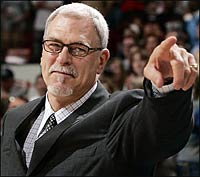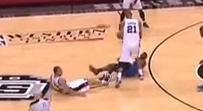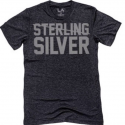 In this edition of the Three-Man Weave, the New York Knicks go fishing for a new coach, the NBA Finals get their first taste of flopping, and the league cannot seem to rid itself of Donald Sterling.
In this edition of the Three-Man Weave, the New York Knicks go fishing for a new coach, the NBA Finals get their first taste of flopping, and the league cannot seem to rid itself of Donald Sterling.
Let’s get to the Q and A, shall we?
1. Derek Fisher is the new coach of the Knicks. Good hire or bad hire?
CHRIS SHERIDAN, EDITOR IN CHIEF: Not to duck the question, but it really is too soon to say. There is no body of work with which to judge Fisher, unless we get into discussing his media skills, which were honed during his time as president of the players’ union and are sharp. The field of acceptable candidates was always going to be limited given Phil Jackson’s insistence on hiring someone who knows the triangle offense, and Fisher can relate to today’s players better than Kurt Rambis or Bill Cartwright could have. Knicks fans had better hope that Fish gets along well with ‘Melo. That could help convince Anthony to stay.
CHRIS BERNUCCA, MANAGING EDITOR: We all know Fisher wasn’t Phil Jackson’s first choice, but he seems to fit the desired mold of a Jackson disciple while avoiding those with past failures (Kurt Rambis), career assistants (Jim Cleamons) or a trip into the way-back machine (Bill Cartwright). Fisher is a smart guy who – with Jackson’s help – will hire trustworthy assistants to help him through the early rough spots. He has the perfect demeanor for dealing with the New York media. And as far as gravitas goes, any current player
who doesn’t respect Fisher’s extensive knowledge and experience is an idiot.
 SHLOMO SPRUNG, ANALYST/COLUMNIST: Knicks new president and overlord Phil Jackson made it clear that he was going to hire one of “his guys,” so in that context Fisher is probably a better hire than a retread like Kurt Rambis or Bill Cartwright. The hope will be that Fisher will learn the triangle offense from Jackson and integrate that with the team. Why Fisher is being paid $5 million per season as a glorified apprentice, I don’t know. But they could have done worse. The jury is still out on Fisher’s ability to coach at any level.
SHLOMO SPRUNG, ANALYST/COLUMNIST: Knicks new president and overlord Phil Jackson made it clear that he was going to hire one of “his guys,” so in that context Fisher is probably a better hire than a retread like Kurt Rambis or Bill Cartwright. The hope will be that Fisher will learn the triangle offense from Jackson and integrate that with the team. Why Fisher is being paid $5 million per season as a glorified apprentice, I don’t know. But they could have done worse. The jury is still out on Fisher’s ability to coach at any level.
2. Dwyane Wade was fined $5,000 for flopping in Game 2 after positively impacting a possession for his team in what turned out to be a one-possession game. Does something more need to be done to stop flopping?
SHERIDAN: Flopping has been and always will be a part of the game, but only the very best actors are going to be able to pull it off in the years ahead because the NBA’s crackdown includes some pretty substantial financial penalties. Wade actually flopped twice in Game 2, so I am surprised the NBA didn’t hit him with two fines. For now, I think it is best to accumulate another season’s worth of evidence before tweaking the penalties.
BERNUCCA: Yes. To paraphrase Bill Maher, New Rules: An initial flopping offense draws a warning. All  ensuing offenses are a one-game suspension without pay. Yes, referees aren’t great at determining when a player flops. But this season, the league has shown it was pretty good at identifying flops after the fact, flagging 35 in the regular season and a handful more in the playoffs. If Wade were docked a game’s pay of $207,444 and the Heat had to play without him, he might think differently about honing his acting skills for his next career. And think how well NBA Cares projects would be funded.
ensuing offenses are a one-game suspension without pay. Yes, referees aren’t great at determining when a player flops. But this season, the league has shown it was pretty good at identifying flops after the fact, flagging 35 in the regular season and a handful more in the playoffs. If Wade were docked a game’s pay of $207,444 and the Heat had to play without him, he might think differently about honing his acting skills for his next career. And think how well NBA Cares projects would be funded.
SPRUNG: I don’t often – or ever – say that the NBA can learn something from the NHL, but it is germane here. If a hockey ref feels like a player is flopping – or “embellishing” in the NHL vernacular – it is a two-minute minor and the flopper is penalized. It would probably take some training for basketball refs to call a flop in the middle of a game, but anyone caught in the act, such as Wade’s blatant act of gamesmanship in Game 2, should be assessed a personal foul at the least. And stepping up those fines wouldn’t hurt, either.
3. How does Donald Sterling’s change of heart and decision to sue the league change the offseason picture for the Clippers and the NBA?
SHERIDAN: He will change his mind again. His lawsuit is pointless given that Shelly Sterling has indemnified the NBA, so all he really would be accomplishing is slowing down the process and delaying the inevitable. It seems Sterling is more interested in gumming up the process, since he feels he was wronged and does not want to acquiesce and go quietly. He is wasting his time, but he probably doesn’t care. He appears to enjoy fighting losing battles in the courtroom. Strange guy.
 BERNUCCA: It could make things awkward. Even if Sterling’s lawsuit is baseless, he could hamstring the plans of the Clippers simply by getting a delay, continuance or injunction from a sympathetic judge who believes in due process. If that judge the team from doing business until there is a resolution, the Clippers will be unable to make trades or sign free agents. In addition, they may also be unable to line up sponsors, lease luxury suites or sell season ticket packages. And the longer Sterling’s name is associated with the Clippers, the less attractive they become to players everywhere, including the ones already on their roster.
BERNUCCA: It could make things awkward. Even if Sterling’s lawsuit is baseless, he could hamstring the plans of the Clippers simply by getting a delay, continuance or injunction from a sympathetic judge who believes in due process. If that judge the team from doing business until there is a resolution, the Clippers will be unable to make trades or sign free agents. In addition, they may also be unable to line up sponsors, lease luxury suites or sell season ticket packages. And the longer Sterling’s name is associated with the Clippers, the less attractive they become to players everywhere, including the ones already on their roster.
SPRUNG: It definitely makes this offseason an uncertain one for the Clippers. Transfers of ownership have been handled in different ways by American sports leagues. When the Texas Rangers were coming out of bankruptcy and being sold to new ownership in the middle of a season, they were allowed to make trades and spend more money even though the team was currently in limbo. The Clippers will be dealing with a similar dynamic. Doc Rivers will want to make the personnel decisions to improve the team, but will approval be given by Sterling, who likely has no desire to play nice right now? Or will it go through Steve Ballmer, who would likely want to appease someone of Rivers’ stature? That will be the defining question of LA’s offseason, and one that may not be answered until it’s too late.
If Wade was fined for flopping, then why wasn’t Splitter fined for the flop on the rescinded James flagrant foul.